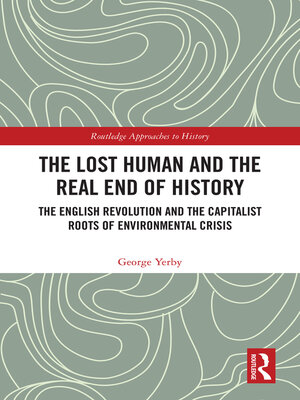The Lost Human and the Real End of History
ebook ∣ The English Revolution and the Capitalist Roots of Environmental Crisis · Routledge Approaches to History
By George Yerby

Sign up to save your library
With an OverDrive account, you can save your favorite libraries for at-a-glance information about availability. Find out more about OverDrive accounts.
Find this title in Libby, the library reading app by OverDrive.



Search for a digital library with this title
Title found at these libraries:
| Library Name | Distance |
|---|---|
| Loading... |
This book analyses the transformation in 16th- and 17th- century English economic life that overturned the traditional restraints of the medieval economy for the commercial ethos that governs the modern world, and the resulting imbalance which opened the way to the environmental breakdown of today.
On the open fields and commons, the smallholders had worked closely with the land as given, with minimal intervention in natural processes. The 16th century introduced a fundamental difference of approach as the inducement of exceptional profits encouraged manipulative exploitation of the land. "Freedom of trade" from arbitrary restraints and impositions became the new economic ethos, officially established by the mid-17th-century revolution and reinforced by other changes such as the emergence of the nationstate. The "rise of science" was associated with the agriculturalist adoption of empirical method for "improvement", and a new philosophy accorded humankind the right to degrade other species for its own ends. By focusing on the causes and effects of capitalism at its first appearance, this volume traces the environmental crisis back to the switch from an essentially universalist to a basically individualist world.
This book will be of interest to scholars and students of Early Modern England, Economic Studies, and Environmental Studies.







